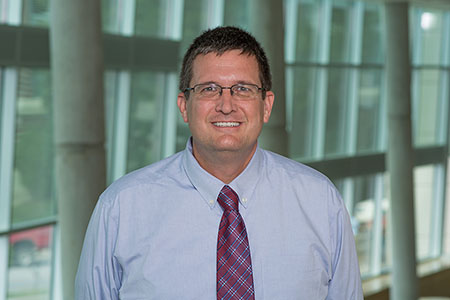Munroe-Meyer Institute (NE UCEDD/LEND) Nets $1.2 million Department of Education Grant
December 6, 2018

|
Mark Shriver, Ph.D., professor of psychology and pediatrics at the Munroe-Meyer Institute, will be the project director on a new $1.2 million Department of Education grant from the Office of Special Education Programs.
The five-year grant, which runs through a development year and four years of implementation, will train graduate students to work collaboratively in interdisciplinary teams to address significant behavior problems in schools.
"We will be developing a common training program around our Applied Behavior Analysis (ABA) courses, but also through practical experiences, for students in special education master's programs, school psychology and applied behavior analysis," Dr. Shriver said. "We'll be training select students from those programs."
The program will draw from existing curriculum on collaboration and behavior interventions, but some material will be newly created, Dr. Shriver said.
"We have a seminar that is going to be implemented throughout the year for these students to participate in that will focus on leadership and advocacy, similar to some of the content in the Leadership Education in Neurodevelopment and Related Disorders (LEND) program, but with more focus on education settings."
MMI's Sara Kupzyk, Ph.D., and Brandy Clarke, Ph.D., will participate in the program, which will be a collaboration with University of Nebraska at Omaha faculty members Adam Weaver, Ph.D., and Phil Nordness, Ph.D.
The goal is to have the training program up and running by the fall 2019 semester. Dr. Shriver said students already are being recruited.
"There's a huge need for people who can work with significant behavior challenges in schools," Dr. Shriver said. "So the goal of the grant is to create a program that can train school-based professionals to address these needs."
The program will be a two-year program for special education and ABA students and three years for school psychology students. By the end of the grant period, Dr. Shriver said, there should be 18 students trained through the program.
"Every special education director across the state will tell you that they have significant behavior issues in classrooms," Dr. Shriver said. "To address that, it can't just be one person, whether the special educator, the ABA person or the school psychologist. They have to work together -- in order to have enough support for the student, you have to have people with these different perspectives coming in that can work together to develop needed supports."
Dr. Shriver said the award of the grant is a recognition of MMI's strength as an interdisciplinary, collaborative entity, not only within the institute but also in the wider community.







